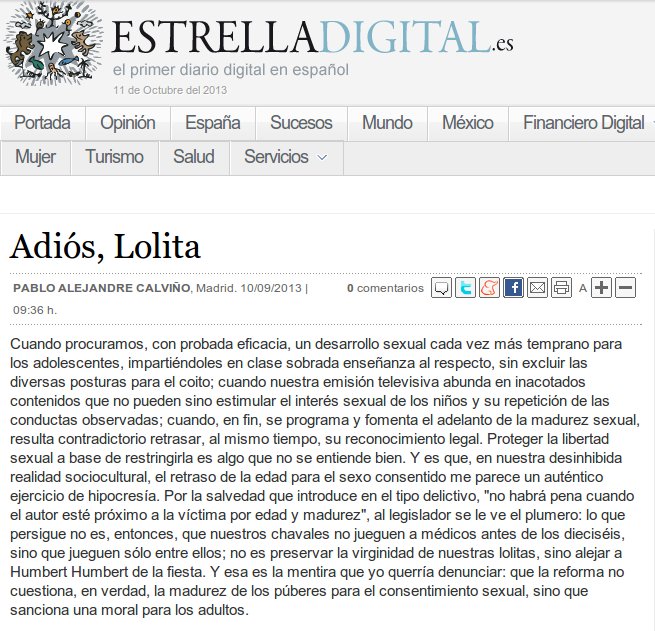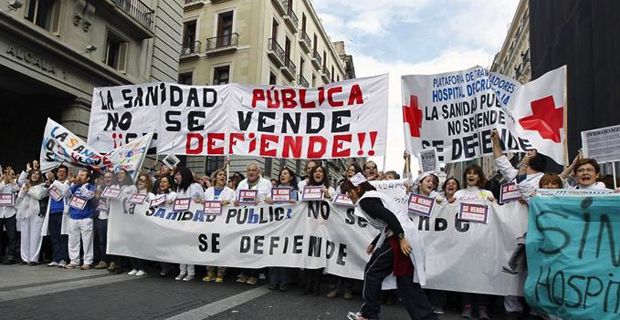.
Spanish Government will raise the age of sexual consent from thirteen to sixteen. This change -it is said- aims to fight against abuse and child prostitution, not to penalize “sexual relationships among equals”. To this purpose, it will be considered a crime (abuse) to perform sexual acts with a person under sixteen, even if he/she consents, but with an important qualification: there will be no crime if both are alike in age and maturity, not to penalize behaviours that might belong to social reality.

It’s certainly laudable to protect minors; but there are two sides of this project which call my attention. One is this new figure of speech: “sexual relationships among equals”, subjective and ambiguous as they come, and introductory of an unwanted moral content in the Penal Code; not to mention that it might even violate the Constitution, as far as it restricts the minors’ freedom to choose their sexual partners. Besides, it suggests -or, at least, opens the door to- the possibility of extending, under the same “equals” fundation, the exemption of responsibility to other typified criminal behaviours.
The other is the wrong -to my belief- assumption that only sexual relationships “among equals” (whatever this means) belong to the social reality. No doubt, such relationships are much more common than those taking place among “unequals”; but dismissing the latter from social reality is a too bold step. Statistics support that many Lolitas choose an adult as their sexual playmate, and it’s also not unfrequent to find boys who sleep with women of age. Why these cases should be outside of social reality?
For typifying a crime, we must in the first place to attend to the legal right we want to protect; in this case, minors’ sexual freedom. But protecting a freedom by way of curbing it sounds somewhat puzzling, and we wonder: what does sexual freedom precisely mean? Lacking a legal definition, and linking to the aim of fighting sexual abuse, it’s reasonable to understand it as, for instance, the freedom to decide, consciously and responsibly, upon how a person wants to sexually dispose of their bodies; and this ability to freely and maturely decide, this sexual responsibility, the teenager either has it or lacks thereof, but it has nothing to do with the “likeness in age and maturity” of the chosen mate. (Quite another thing would be the how easily they can be influenced; but, had we to take into account this ductility of human will in every behaviour, we’d end up doing without the principle of responsibility and, then, we’d have to dismantle the whole penal thingy.) Thus, if the Government considered that people under sixteen lack the necessary ability for taking a mature decision on their sexual activities, all sex with them should be penalized, with no exception. But this is not the case: the future revision of the Spanish penal code, by allowing sex among equals, clearly means that preserving the virginity of minors until they can dispose of sensibly is not its goal; and the only conclusion is, the boasted protection of minors consists simply in limiting the range of people they can chose as mates: only those who are alike in age and growth. We don’t aim, then, at our children not playing doctors before sixteen, but at them playing among themselves. We don’t mean to defend our Lolitas‘ integrities, but to keep Humbert Humbert away from the party.
On the other hand, Spain struggles for many years to achieve an earlier sexual education and development for teenagers; our broadcast programming abunds in uncurbed content full of explicit references to sex and promiscuity which can’t but arise sexual interest of children and stimulate their replaying of the watched behaviours; and during the last decades the age for having the first sexual experiences has dropped one or two years. In such a society sounds somewhat contradictory to postpone the legal acknowledgement of such earlier sexual ripeness.
Then, how this selective curb is justified?, how can we explain this sexual consent age’s leap from thirteen to sixteen… only when it comes to sex with adults?
And which is the undefined limit for this “alikeness in eath and ripeness”? Definitely not sixteen, as, happening to be absurd to incriminate two minors who had had sexual intercourse between them, making victims of themselves at the same time, the exception wouldn’t be necessary in the legal text. Eighteen, perhaps? Hmm… Sexual relations between a boy eighteen and a girl fifteen don’t seem to be outside the “social reality” that wants to be respected, as such couples must be, certainly, quite common in our nowadays sexually liberated society. Twenty, then? Maybe. We don’t know, and we won’t know until we build case-law along the years to come. Every new breach exposed to our judges’ capriciousness turns into a crack for Justice, in upper-case letters.
Be as it will, there is an undeniable conclusion: when we fight sexual abuse and seek minors’ sexual freedom protection, if we consent young adults having intercourse with minors and we forbid the same to the rest of adults, we’re presupposing the laters fulfilled abuse, violating the sacred presumption of innocence. And this, reader, is an outrage; a discrimination implying the system’s incompetence, or failure and give up, to objectively tell in which cases there is abuse and in which don’t. It’s easier to imprison any adult who had sexual relations with a young teenager, regardless of the consent, than trying to find out whether or not there was abuse. Worse yet: it’s not only easier, but politically more profitable, as it suits the morals of a vindicating and outspoken part of the population who don’t like their young daughters -it’s always the daughters- to go out with older boys, and who would be delighted to see these in jail..
El Gobierno reformará el código penal para elevar la edad de consentimiento sexual desde los trece a los dieciséis años. La medida -se dice- va encaminada a luchar contra los abusos y la prostitución infantil, no a penalizar las relaciones sexuales entre iguales. A tal efecto, se considerará hecho delictivo (abuso) la realización de actos sexuales con un menor de dieciséis años aunque éste preste su consentimiento, pero con una importante salvedad: no habrá delito si ambos están próximos en edad y madurez, para no criminalizar conductas que puedan responder a la realidad social.

Aspiración encomiable es la de proteger a los menores, desde luego; pero hay en este proyecto, para empezar, dos aspectos que me llaman la atención. Uno de ellos es esta nueva figura de las “relaciones sexuales entre iguales”, subjetiva y ambigua donde las haya y que, además, introduce en el Código un indeseable contenido moral; por no mencionar que puede vulnerar la Constitución en cuanto restringe la libertad de los menores para elegir a sus parejas. (Aparte, esta figura sugiere -o al menos deja abierta- la posibilidad de extender, con idéntico fundamento de igualdad, la exención de responsabilidad a otras conductas tipificadas como delito.)
El otro de los aspectos llamativos es la asunción de que sólo responden a la realidad social las relaciones sexuales “entre iguales”. No niego que tales relaciones son mucho más frecuentes que las que puedan darse “entre desiguales”; pero de aquí a desterrar de la realidad social a estas últimas va un paso demasiado atrevido. Las estadísticas avalan que muchas jovencitas eligen por compañero de juegos eróticos a un adulto, sin faltar casos de jovencitos que se acuestan con adultas. ¿Esto no forma, también, parte de la realidad social?
Cuando se tipifica una conducta como delito, ha de atenderse en primer lugar al bien jurídico que se desea proteger; en este caso, la libertad sexual de los menores. Mas proteger una libertad a base de restringirla es algo que no se entiende muy bien, así que tenemos que preguntarnos: ¿qué se considera concretamente libertad sexual? A falta de una definición legal, y enlazando con la aspiración de luchar contra los abusos, parecería razonable entenderla algo así como la libertad para decidir, de manera consciente y responsable, lo que cada uno quiere hacer con su cuerpecito serrano y olé; y esta capacidad de decisión libre y madura, esta responsabilidad sexual, se tiene o no se tiene, pero es ajena a la “proximidad en edad y madurez” del compañero elegido. (Cosa muy distinta sería la mayor o menor facilidad para ser influido; pero si hubiésemos de tener en cuenta esta ductilidad de las voluntades en todas las conductas acabaríamos por prescindir del principio de responsabilidad y, a continuación, desmontaríamos de arriba a abajo todo el tinglado punitivo.) De este modo, si el legislador considerase que los menores de dieciséis años carecen de la capacidad necesaria para tomar una decisión madura sobre sus actividades sexuales, debería penalizar sin excepción todos los actos sexuales realizados con ellos; pero no es así, ya que la futura redacción del Código penal deja claro, al permitir el sexo entre iguales, que preservar la virginidad de los adolescentes hasta que puedan disponer de ella con sensatez no es su objetivo. De modo que sólo puede concluirse que la tan cacareada protección de los menores se limita a restringir el espectro de personas con las que éstos pueden aparearse: sólo con quienes estén próximos en edad y desarrollo. No se persigue, pues, que nuestros chavales no jueguen a médicos antes de los dieciséis, sino que jueguen sólo entre ellos. No se busca defender la integridad de nuestras Lolitas, sino simplemente alejar a Humbert Humbert de la fiesta.

Carta publicada en Estrella Digital
Por otra parte, cabe preguntarse cómo se justifica el salto de los trece a los dieciséis para el consentimiento sexual en una sociedad que lleva lustros intentando orientarse hacia una educación y desarrollo sexual más temprano para los adolescentes; en una sociedad cuya emisión televisiva abunda en inacotados contenidos, llenos de erotismo, desinhibición y promiscuidad que no pueden sino estimular el interés sexual de los niños y su repetición de las conductas observadas; y en una sociedad donde, durante las últimas décadas, se ha reducido sensiblemente la edad en que los preadolescentes se estrenan en el maravilloso mundo del placer. Siendo así las cosas, ¿no es contradictorio retrasar la edad para el reconocimiento legal de esta temprana madurez sexual?
Como cabe, desde luego, preguntarse también cuál es el indeterminado límite para esa
proximidad en edad y desarrollo. Si la reforma se hubiese redactado sin la salvedad del “sexo entre iguales”, sólo podría cometer tal abuso quien estuviera por encima de los dieciséis, ya que por debajo se daría la paradoja de ser ambos amantes, al mismo tiempo, víctimas y abusadores. (En efecto, si dos jóvenes de catorce y quince años se acoplan voluntariamente bajo la mirada de Eros, ¿quién habría abusado de quién? Ambos serían delincuentes y víctimas, así que ninguno debería ser castigado.) Luego es evidente que esa “proximidad” apunta a una edad más elevada. ¿Dieciocho años, tal vez? Hmm… no parece que las relaciones entre un chaval de dieciocho y una chica de quince caigan fuera de esa realidad social que el reformador afirma respetar, ya que tales apareamientos han de ser muy comunes en la liberada sociedad contemporánea. ¿Veinte años, entonces? Supongamos que sí, aunque bien podrían ser veintidós o veinticinco; no lo sabremos hasta que haya abundante jurisprudencia. (Y, mientras tanto, cada fisura que se abre a la arbitrariedad de los jueces se convierte en una gran brecha para la Justicia, con mayúscula. Inocentes pagarán por estos remilgos legales.)
Concluyamos el razonamiento partiendo de este último supuesto: que el consentimiento sexual de un menor de dieciséis exime de responsabilidad penal por abuso a jóvenes de hasta veinte años por término medio. ¿En qué se fundamenta esta selectiva restricción de la validez de ese consentimiento? Si el objetivo es luchar contra los abusos y progeter la libertad sexual de los menores, ¿por qué éstos pueden tener relaciones con un joven de veinte y no con uno de veintidós? La deducción me parece clara: porque en el segundo caso presuponemos el abuso y en el primero no; con lo cual
acabamos de vulnerar el sacrosanto principio de presunción de inocencia. Y esto, amigo lector, me parece un atropello que, además, supone una discriminación por la edad y constituye la prueba del lacerante fracaso judicial para discernir (o la renuncia a intentarlo), en cada caso particular, cuándo ha habido abuso y cuándo no. Por el “delito” de tener relaciones con un quinceañero es más cómodo condenar a todo el que pase de los veinte (o la edad que sea), se haya violentado o no la libertad sexual, que intentar discernir si hubo abuso. Más aún: no sólo se viola la presunción de inocencia, sino que
se introduce en el código penal un componente moral que, para colmo, sólo acomoda a un sector de la población: a quienes, viendo con muy malos ojos que sus hijas -siempre son las hijas- se enrollen con tíos mayores, estarán encantados de que los encierren.




